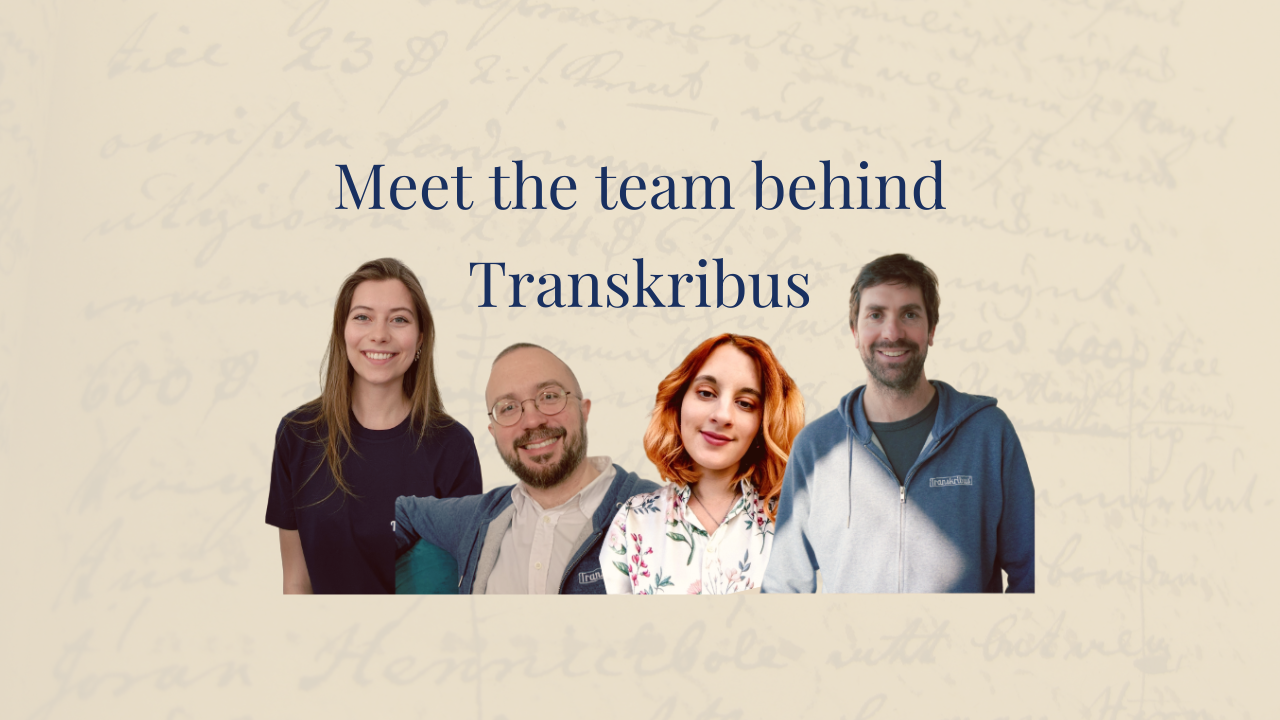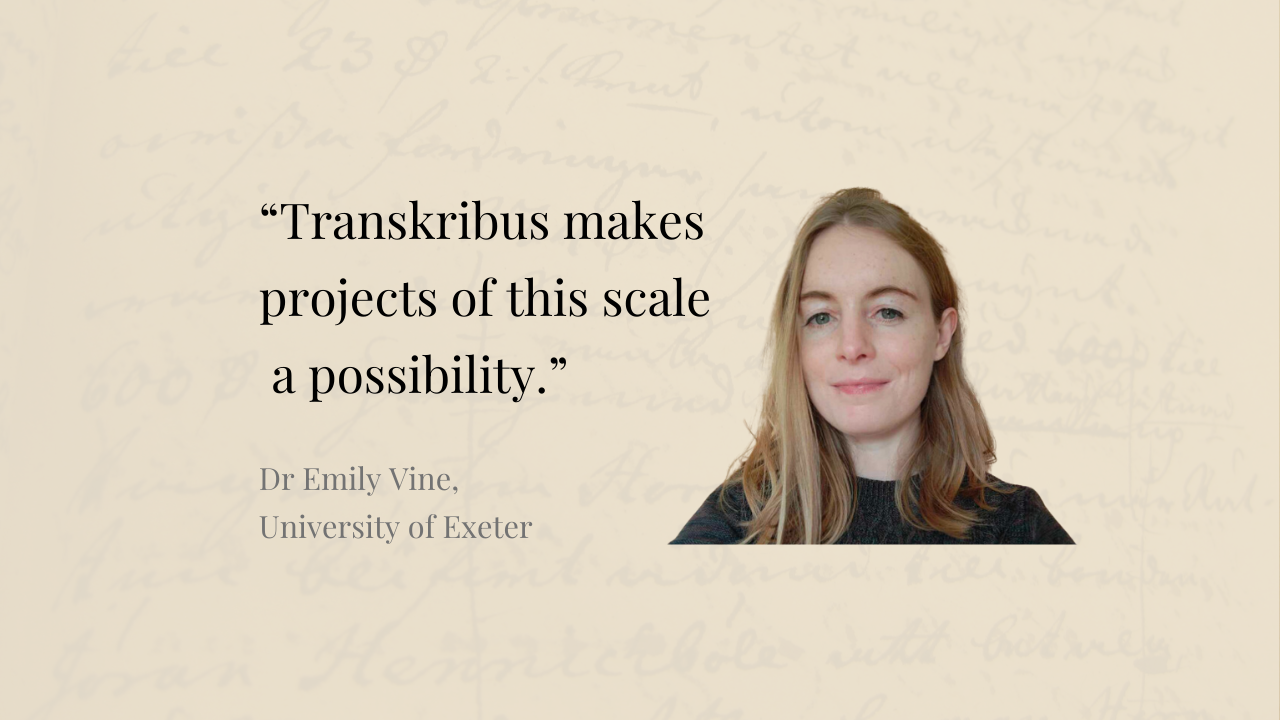
Transkribus User Conference 2020
Our 3rd Transkribus User Conference will take place at the University of Innsbruck on 6-7 February 2020. Information will be shared about our recently founded READ-COOP SCE, latest technical developments and how Transkribus is used by several projects around the world. Also there will be ten workshops to complete the program. And finally there is the chance to go skiing and sledging with Transkribus team members on Saturday 8th February.
Venue
The conference will take place at the Faculty of Catholic Theology of the University of Innsbruck, which is in the city centre of Innsbruck. The address of the conference building is: Karl-Rahner-Platz 3, 6020 Innsbruck.
Registration
Unfortunately registration is not possible any more – we are fully booked.
Conference fees
- READ-COOP SCE members: free access
- Undergraduates: 30 EUR
- Regular attendees: 70 EUR
Coffee, lunch and conference dinner are included in the conference fee!
Program
Thursday, 6th of February
09:30-10:00 Registration
10:00-10:15 Opening words – Ulrike Tanzer (vice rector for research – University of Innsbruck)
10:15-10:30 General introduction – Günter Mühlberger (University of Innsbruck)
10:30-11:00 After the grant: Transkribus as part of READ-COOP SCE. – Status quo and outlook – Andy Stauder (read-coop)
11:00-12:00 Transkribus in practice presentations
120 years of alpine mountaineering – the Alpenverein-project – Gerhard Rampl, Andrea Mussmann (University of Innsbruck)
Transkribus at the National Archives of the Netherlands – Liesbeth Keijser (National Archive Netherlands)
Ottoman Turkish – Suphan Kirmizialtin (University of New York)
ScanTent in practise – Erika Kuijpers (Vrije Universiteit Amsterdam)
Il Cartastorie – Banco di Napoli – Sergio Riolo, Andrea Zappulli (Banco di Napoli Foundation)
12:00-12:30 New features in Transkribus Sebastian Colutto (read-coop)
12:30-13:30 Lunch
13:30-15:00 Parallel workshops (1-3)
15:00-15:30 Coffee and cake
15:30-16:00 Share your model – public models in Transkribus
Achim Rabus (University of Freiburg)
Stefan Zathammer (University of Innsbruck)
Günter Hackl (University of Innsbruck)
Vincent Noppe (National Archives Netherlands)
16:00-16:30 Search collections with Transkribus – Felix Dietrich, Berthold Ulreich (read-coop)
16:30-17:30 Parallel workshops (4-6)
from 20:00 Dinner and come together at the “Biertstindl”-restaurant
Bierstindl: Klostergasse 6, 6020 Innsbruck (https://www.bierstindl.eu/). We will organize meeting points for those who want to go by tram or to walk (30′):
- Johanna at Innsbruck Landesmuseum, tram leaving at 19:33 (please ask in your hotel for tickets)
- Günter walking from Annasäule at 19:15
Friday, 7th of February
09:30-10:30 What users think about Transkribus – Melissa Terras (University of Edinburgh)
Crowd-sourcing with VeleHanden and Transkribus – Jirsi Reinders, Pauline van den Heuvel (Amsterdam City Archives)
Parallel workshops (7-8)
10:30-11:00 Transkribus in practice presentations
Late medieval writing – the Ambraser Heldenbuch – Aaron Tratter (University of Innsbruck)
Beyond 2022 – David Brown (Trinity College Dublin)
D.E.E.D.S-project – Hannah Lloyd (University of Toronto)
11:00-11:30 Coffee and cake
11:30-12:30 Visualizing data from parish registers – Herve Dejean (Naverlabs)
Cadastre maps with Transkribus – Günter Mühlberger (University of Innsbruck)
Parallel workshops (9-10)
12:30-13:00 Closing words
Workshops:
Workshop 1: Transkribus for beginners – Tamara Terbul, Johanna Walcher (University of Innsbruck)
Transkribus is an expert programme and it needs some training to fully understand the concept and all the features and possibilities offered by the programme. The WS will provide an introduction and enable users to work with their own documents.
Workshop 2: Training of large models – Dirk Alvermann (University of Greifswald), Achim Rabus (University of Freiburg)
Many users ask for models which are able to read not only a specific hand, but are able to cope with many different writers. This WS will give some insights how such models can be created and especially how predictions can be made towards the expected quality of a model for unknown pages.
Workshop 3: Cadastre maps – Günter Mühlberger, Berthold Ulreich (University of Innsbruck)
The first Austrian Cadastre was created during the 19th century. It consists of cadastre maps and accompanying documents. Within the WS we will give an introduction how the recognition of the cadastre maps is carried out and also how crowd users will be involved in the correction of tabular data.
Workshop 4: READ-COOP SCE Workshop – Daniel Wibmer (Raiffeisen Landesbank Tirol), Günter Mühlberger (University of Innsbruck)
A European Cooperative Society is a powerful tool which provides excellent opportunities to collaborate on an intersectoral and international level. READ-COOP SCE is one of the first cooperatives in the cultural heritage and research domain. The WS will provide an opportunity to get a better understanding how cooperatives are working and how interested institutions and persons can take part to shape the future of Transkribus.
Workshop 5: Want to become a trainer for Transkribus? – Tamara Terbul, Johanna Walcher (University of Innsbruck), Annemieke Romein (University of Ghent), Stefano Bazzaco (University of Verona)
The need for training courses and workshops for Transkribus is high and the team in Innsbruck receives many requests in this respect. However it is much more efficient if the Transkribus team needs not to travel but that training can be offered by local trainers. Therefore we are looking for people who would be interested and willing to become a Transkribus trainer. The WS will provide the opportunity to discuss this option and to hear about the experiences made already by people who organized Transkribus workshops independently from the Transkribus team.
Workshop 6: Working with tables – Herve Dejean (Naverlabs), Alexis Litvine (University of Cambridge)
Tables are among the most important document types. Table recognition receives nowadays a lot of attention by research groups from all over the world. The WS will provide uptodate information on how to benefit from newest developments in the table recognition area.
Workshop 7: Structure recognition – Sebastian Colutto (read-coop), Günter Mühlberger (University of Innsbruck)
With the P2PaLa tool it is possible to train structural features of an image. E.g. drawings can be separated from text, marginalia or – very useful – specific columns in tables can be detected automatically. The WS will give an introduction to the tool and show examples how it can be used in practise.
Workshop 8: Middle ages and early modern times – Tobias Hodel (University of Bern)
A significant amount of users in Transkribus are interested in documents from the middle ages and early modern times. Therefore already a large number of data are available and can be used to train robust general models. The WS is intended to gather all those who are specifically interested in this time period and who want to exchange their experiences with other users.
Workshop 9: Arabic, Hebrew and Osmanic in Transkribus (Suphan Kirmizialtin, University of New York)
Several teams around the world have trained Arabic and Hebrew models in Transkribus. Even transliterations from Ottoman Turkish alphabet into modern Latin Turkish were performed with success. The workshop will provide background information on such projects and try to gather Transkribus users who are interested in this area.
Workshop 10: Text2Image – Günter Hackl (University of Innsbruck), Sebastian Colutto (read-coop)
The t2i tool is useful for matching existing transcriptions with the a page image. It offers a manual mode as well as an semi-automated mode. In this way small as well as large collections of existing transcripts can be utilized for training models – without the need to carry out transcriptions from scratch.
Within the registration process you will be asked to choose the workshop sessions you prefer.
Accommodation information
We have contingents in three hotels, which you can check out and book under the following link:
For English-speakers: https://web4.deskline.net/innsbruck/en/accommodation/list?&SelArrivalDate=20200205&selNights=2&lkPG=de63de3d-955f-4cfe-94a0-c561079014ff
For German-speakers: https://web4.deskline.net/innsbruck/de/accommodation/list?&SelArrivalDate=20200205&selNights=2&lkPG=de63de3d-955f-4cfe-94a0-c561079014ff
The contingents will be blocked until mid of December. If you would like to make use of this, please book as soon as you can as contingents are booked out quickly usually.
Alternatively, you can of course book your room directly at the hotel’s homepage or via a booking platform. Here are some more hotels we can recommend:
- Austria Trend Hotel Congress: https://www.austria-trend.at/de/hotels/congress-innsbruck
- Best Western Hotel Goldener Adler: https://www.goldeneradler.com/
- Hotel Innsbruck: https://www.hotelinnsbruck.com/
- Hotel Schwarzer Adler: https://www.schwarzeradler-innsbruck.com/home.html
- The Penz: https://www.the-penz.com/
- Stage 12: https://www.stage12.at/
Open space for bilateral meetings on Friday afternoon
After the ending of the conference on Friday we will still have rooms available for spontaneous meetings between participants. If you have made a contact at the conference and would like to have a meeting before leaving, you can let us know in the course of the event, so we can provide a room to you.
Social events on Saturday
For all those who will stay in Innsbruck for the weekend, we would like to organise two social events to choose. If you are interested, you can register via Conftool.
- Skiing at Axamer Lizum
Axamer Lizum is a skiing resort in the vicinity of Innsbruck with possibility to go there by bus. For everybody who would like to join, we would meet directly in the skiing resort at 12 noon at the valley station of the “Schönbodenbahn” chairlift.
Via this link you can check out the skiing resort: https://www.axamer-lizum.at/en/service-our-guests.html
It is possible to borrow the skiing equipment directly at Axamer Lizum. All the info can be found here: https://www.axamer-lizum.at/en/skiing-school-amp-ski-rentals.html
The price for a full day pass is € 41,50, but there are more options like half-day-tickets, tickets for special hours – all the prices for ski passes you can check out here: https://www.axamer-lizum.at/en/prices-axamer-lizum.html
The bus connection can be looked up here: https://www.vvt.at/page.cfm?vpath=index
Stations to enter in the city centre of Innsbruck would be Innsbruck “Hauptbahnhof” or “Finanzamt”.
- Sledging
Second option is sledging – destination will the Gleinserhöfe nearby Innsbruck. Together with Günter you will go there by bus and return by taxi – likely arrive in Innsbruck around 16:00. The climb will be about one and a half hour way and sledges can be borrowed for free. Before sledging down we will have Lunch together at the Gleinserhöfe.
We will meet at 10:45 at the Main Railway Station – Bus terminal F.
Bus 4140 to Schönberg/Stubaital. We will get out at Gemeindeamt Stubaital.
Please take good shoes (better boots), warm trousers, anorac, cap and gloves (important)!
Contact details
If you have any questions about the conference please contact email@transkribus.eu


